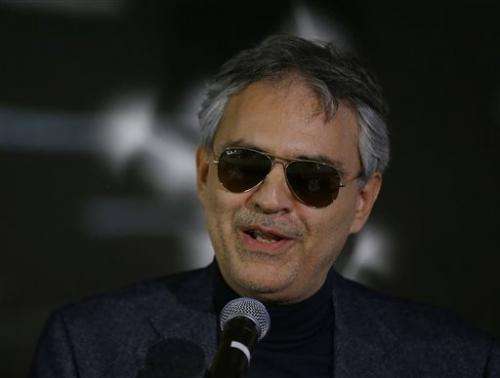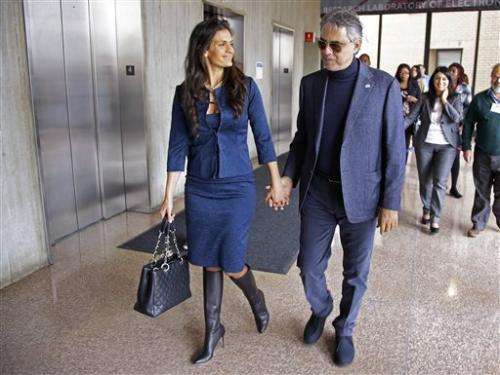Andrea Bocelli speaks during a day of workshops on vision impairments and social impact programs at the Massachusetts Institute of Technology in Cambridge, Mass., Friday, Dec. 6, 2013. (AP Photo/Stephan Savoia)
Italian classical singer Andrea Bocelli says he might one day get to use the tools that researchers around the world are developing with support from the foundation that bears his name.
Scientists and engineers working on high-tech hardware and software to help people with low or no vision make their way through the world gathered at Massachusetts Institute of Technology on Friday to share some of what they're working on.
Technology on display included a smartphone app that uses a camera, accelerometer and compass to help a blind person navigate an intersection, a computer vision program that can read body language, and retinal prostheses to replace damaged photoreceptors.
The daylong workshop was organized by MIT and the Andrea Bocelli Foundation, launched in 2011 to focus on poverty, illiteracy and the disabled. Also on Friday, the foundation hosted a second workshop, in partnership with MIT's Abdul Latif Jameel Poverty Action Lab, focused on humanitarian programs.
The topic of assistive technology for the blind hits close to home for Bocelli, 55, who was born with congenital glaucoma and lost his sight completely after a childhood soccer accident. Bocelli introduced the proceedings and was on hand to listen to the futuristic presentations.
Andrea Bocelli walks hand-in-hand with his wife Enrica Cenzatti Bocelli during a day of workshops on vision impairments and social impact programs at the Massachusetts Institute of Technology in Cambridge, Mass., Friday, Dec. 6, 2013. (AP Photo/Stephan Savoia)
"I'm here just to support the people who are actually working, to thank the people who have done the work," Bocelli said through a translator. Perhaps, he added, he might one day use the tools that researchers are developing with support from his foundation.
"I've always been very technologically inclined," Bocelli said. "I'm really impressed by the progress of technology so far."
The workshop included presentations by researchers from Italy and across the United States, including a team from the MIT Fifth Sense Project, the recipient of a $500,000 grant from the Bocelli Foundation.
A collaboration between researchers from Northeastern University in Boston and MIT's Computer Science and Artificial Intelligence Laboratory, the project is developing wearable sensors to detect terrain and environmental hazards, recognize nearby people and read text. Team members have also created a bicycle that uses computer vision to help a blind person navigate around an outdoor track.
"It's just great to see the money and the mind-power behind this," said Rabih Dow, a director at the Carroll Center for the Blind in Newton, Massachusetts who came to listen to the presentations.
Dow, 47, has been totally blind since age 16, and during that time he has benefited from great improvements in assistive technology. While the first adapted computer he used in the 1980s was "massive" and cost tens of thousands of dollars, today he carries an iPhone equipped with an array of apps that help him read the newspaper, navigate city streets and distinguish denominations of paper currency.
"We're not talking about anything exciting," Dow said. "We're talking about basic human needs, about dignity."
© 2013 The Associated Press. All rights reserved.
























